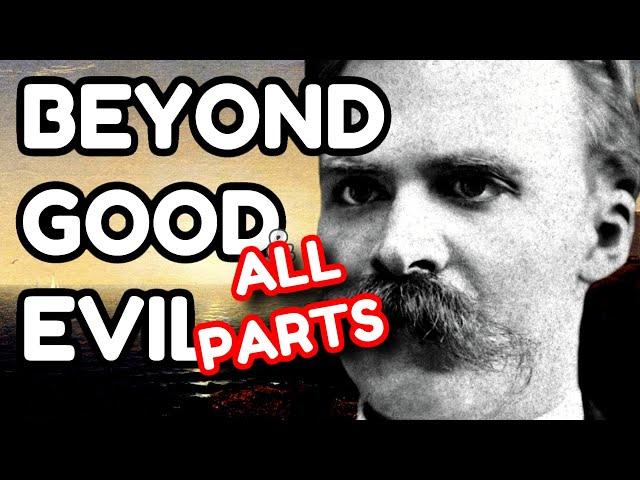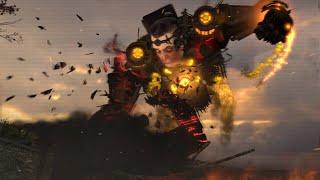
NIETZSCHE Explained: Beyond Good and Evil (ALL PARTS)
Support us on Patreon, get access to exclusive videos:
▶ https://www.patreon.com/WeltgeistYT
WATCH:
▶ Why Nietzsche Hated Socrates: https://youtu.be/DM78nStythg
OUR ANALYSES:
▶ Beyond Good and Evil: https://youtu.be/WIHXZUltfqk
▶ The Antichrist: https://youtu.be/qej1Z8Qzq_c
▶ Genealogy of Morals: https://youtu.be/6PUx4cOfFcI
▶ Twilight of the Idols: https://youtu.be/YpVr_NEvWYA
▶ The Will to Power: https://youtu.be/He6ZC7ZFBt8
▶ Daybreak: https://youtu.be/cOL2z7nuXdA
▶ The Joyful Science: https://youtu.be/U0fTBOJ-C_I
Friedrich Nietzsche's Beyond Good and Evil is one of the most important works in Western philosophy. Written in 1886, it represented Nietzsche's attempt to elucidate ideas first written about in Also Sprach Zarathustra (Thus Spoke Zarathustra). Unfortunately, the book is also very difficult and widely misunderstood. This video attempts to set the stage for a deeper understanding of this seminal work of German philosophy.
In this first part, we explore the significance of the title, Beyond Good and Evil: Prelude to a Philosophy of the Future, and we introduce the concept of the "philosophical prejudice" which is the main theme of the work. Nietzsche believed "other philosophers" (all those who came before him; notably Descartes, Kant, Plato, Schopenhauer and the Stoics) suffered, unbeknownst to them, from hidden presuppositions. Nietzsche, the philosopher with the hammer, seeks to destroy these presuppositions and lead the charge in the creation of a new philosophy of the future.
In this first part we mainly discuss Nietzsche's treatment of Descartes famous "cogito ergo sum", "I think, therefore I am" argument.
The Will to Power is one of the most famous concepts in Nietzsche's philosophy. In the second part we will explore the concept as it appears in the work, Beyond Good and Evil.
Nietzsche's problem with the old philosophers of the past, such as Kant, Descartes, Spinoza, and Schopenhauer, continue. He accuses these philosophers not of having a will to Truth, but of having a will to Power. He then asks us the question: can this will to power explain the state of affairs in the world? Do we even need Christianity, or some complex “otherworldy” philosophy, like those of Schopenhauer, Spinoza, or Kant? What if the world is Will to Power — and nothing besides? What does that look like? This part explores Nietzsche’s tentative answer.
In the third part on Nietzsche's Beyond Good and Evil, we explore the concept of slave morality. Particularly as it pertains to Christianity and Schopenhauer's philosophy. A lot of what is said in this video, is elaborated on in Nietzsche's subsequent work, On the Genealogy of Morals. If this video does well, we will release a full video on this seminal philosophical work.
Nietzsche's main critique on Christianity is that the Christian is weak; anti-life; unnatural. Why? Because the Christian (as does Schopenhauer) regards this world as not that important: it's a preparation for the afterlife. Christians think this because they are a powerless class, as opposed to the ancient Romans who were their historical enemies. The slave revolt in morals is a famous Nietzschean concept and appears together with "ressentiment" in Beyond Good and Evil.
▶ https://www.patreon.com/WeltgeistYT
WATCH:
▶ Why Nietzsche Hated Socrates: https://youtu.be/DM78nStythg
OUR ANALYSES:
▶ Beyond Good and Evil: https://youtu.be/WIHXZUltfqk
▶ The Antichrist: https://youtu.be/qej1Z8Qzq_c
▶ Genealogy of Morals: https://youtu.be/6PUx4cOfFcI
▶ Twilight of the Idols: https://youtu.be/YpVr_NEvWYA
▶ The Will to Power: https://youtu.be/He6ZC7ZFBt8
▶ Daybreak: https://youtu.be/cOL2z7nuXdA
▶ The Joyful Science: https://youtu.be/U0fTBOJ-C_I
Friedrich Nietzsche's Beyond Good and Evil is one of the most important works in Western philosophy. Written in 1886, it represented Nietzsche's attempt to elucidate ideas first written about in Also Sprach Zarathustra (Thus Spoke Zarathustra). Unfortunately, the book is also very difficult and widely misunderstood. This video attempts to set the stage for a deeper understanding of this seminal work of German philosophy.
In this first part, we explore the significance of the title, Beyond Good and Evil: Prelude to a Philosophy of the Future, and we introduce the concept of the "philosophical prejudice" which is the main theme of the work. Nietzsche believed "other philosophers" (all those who came before him; notably Descartes, Kant, Plato, Schopenhauer and the Stoics) suffered, unbeknownst to them, from hidden presuppositions. Nietzsche, the philosopher with the hammer, seeks to destroy these presuppositions and lead the charge in the creation of a new philosophy of the future.
In this first part we mainly discuss Nietzsche's treatment of Descartes famous "cogito ergo sum", "I think, therefore I am" argument.
The Will to Power is one of the most famous concepts in Nietzsche's philosophy. In the second part we will explore the concept as it appears in the work, Beyond Good and Evil.
Nietzsche's problem with the old philosophers of the past, such as Kant, Descartes, Spinoza, and Schopenhauer, continue. He accuses these philosophers not of having a will to Truth, but of having a will to Power. He then asks us the question: can this will to power explain the state of affairs in the world? Do we even need Christianity, or some complex “otherworldy” philosophy, like those of Schopenhauer, Spinoza, or Kant? What if the world is Will to Power — and nothing besides? What does that look like? This part explores Nietzsche’s tentative answer.
In the third part on Nietzsche's Beyond Good and Evil, we explore the concept of slave morality. Particularly as it pertains to Christianity and Schopenhauer's philosophy. A lot of what is said in this video, is elaborated on in Nietzsche's subsequent work, On the Genealogy of Morals. If this video does well, we will release a full video on this seminal philosophical work.
Nietzsche's main critique on Christianity is that the Christian is weak; anti-life; unnatural. Why? Because the Christian (as does Schopenhauer) regards this world as not that important: it's a preparation for the afterlife. Christians think this because they are a powerless class, as opposed to the ancient Romans who were their historical enemies. The slave revolt in morals is a famous Nietzschean concept and appears together with "ressentiment" in Beyond Good and Evil.
Комментарии:
Tyson Alaoha v Jacob Brown ABA Elite 86 Kg NWR Q-Final
VIP Boxing Promotions
Naked Truth
FALSET - Topic
DIMASH, Singing in Spanish?? Opera Singer Reaction & Vocal Analysis
Dr. Marisan: Master Singing
Heroic Power Metal Backing Track in Fm | BT-300
N&M Creation
Тодор Тагарев в "ДЕНЯТ с В.Дремджиев", 18.10.24
ДЕНЯТ с В. Дремджиев
Langen TRF 200 Tray Former
Mpac Group
How to build a TURBOJET ENGINE
colinfurze
Different types of Divan beds
Ashbourne Home Centre


























